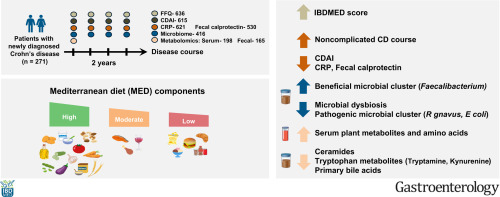The Mediterranean Diet (MD) was recently found to have benefits for patients with Crohn’s Disease (CD) in various stages of the disease, though adherence to it may be limited during active disease. We aimed to evaluate the association between adherence to the MD and changes in fecal calprotectin (FC) levels among patients with CD in clinical and biochemical remission.
A prospective cohort of patients with CD in clinical and biochemical remission [Harvey-Bradshaw Index (HBI) < 5 and FC < 250 μg/g]. Patients with FC ≤ 150 μg/g were further categorized as those in deep biochemical remission. The Israeli Mediterranean dietary screener (I-MEDAS) was used to assess adherence to the MD. The median score of the study sample was used as a cut-off for the classification of “adherent” or “non-adherent”.
A total of 96 patients were included in the analysis. Over time, adherence rate to the MD decreased by 25 % among those who were adherent at baseline and increased by 43.8 % among those who were non-adherent at baseline. Patients who were adherent at baseline had higher rates of deep remission at baseline compared with those who were non-adherent at baseline (96.2 % vs. 79.1 % respectively, p = 0.009), and higher rates of remission and deep remission at 3 months (97.5 % vs. 78.6 %, p = 0.011; and 87.5 % vs. 64.3 %, p = 0.023 respectively), but not at 6 months. Throughout follow-up, the change in FC levels was negatively correlated with the change in adherence to low intake of detrimental MD components (r = −0.340, p = 0.006), but not with high intake of beneficial components (p = 0.733).
Adherence to the MD was associated with lower FC levels at baseline and after 3 months. Future studies should examine the long-term effects of MD adherence on the maintenance of clinical and biochemical remission in CD.


Dining and Cooking